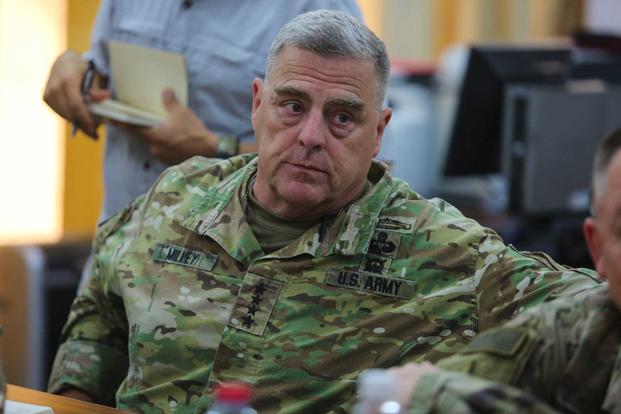Soon after being tapped as the new Army chief of staff in 2015, Gen. Mark Milley made it clear that he wanted his service ready for the next war.
Since then, the gruff-speaking, former Special Forces soldier has hammered away to rebuild a war-weary Army and put it on a path to build a modernized force of soldiers and equipment capable of taking on high-tech foes on a future battlefield.
In his first major speech as chief -- long before the Russia and China were named the top two threats in the 2018 National Defense Strategy -- Milley made readiness his top priority to ensure soldiers were prepared to face Russia in combat.
"After modernizing its nuclear and conventional capabilities in 2008 and updating its military doctrine, Russia has launched on an aggressive foreign policy in the last seven years, attacking Georgia, annexing the Crimea, invading the Ukraine though surrogates, threatening other neighbors that are NATO allies and now militarily intervening in the Middle East to complicate an already complicated and tragic situation," he told an audience in October 2015 at the Association of the United States Army's annual meeting. "It certainly appears to me that Russia considers the United States and NATO to [be] its core interests."
A year later, Milley vowed to defeat Russia and other similar threats in ground combat.
With a reputation as a bold, outspoken leader, he is poised to become the next chairman of the Joint Chiefs of Staff. President Donald Trump nominated Milley to succeed Gen. Joseph Dunford, who is set to retire.
If Milley's nomination is confirmed, he will be the first chairman to serve a four-year term instead of a two-year term as a result of recent changes to the National Defense Authorization Act.
Modernization Efforts
As Milley nears the end of his tenure as chief of staff, he has become known as one of the major drivers behind the Army's ambitious modernization effort. In October 2017, the Army launched a plan to replace its major combat vehicles and aircraft by 2028.
So far, the effort has resulted in the service standing up a new Army Futures Command, which will oversee every aspect of modernization.
But Milley, perhaps, is most well-known for his willingness to shoot straight with Congress, even if it means delivering bad news.
In late May 2017, Milley told lawmakers that he had serious doubts about the Warfighter Information Network-Tactical, the multi-billion-dollar backbone of the Army's tactical network.
WIN-T was part of the Army's Future Combat Systems effort in 2003. After FCS was canceled in 2009, the service tried to salvage the program as part of an effort to create secure battlefield communications for mounted forces on the move, an effort led by General Dynamics Corp. that has cost about $6 billion.
Milley told Congress he was concerned that WIN-T is unable to operate on the move or in large, complex urban areas and may be unable to survive on the future battlefield.
Four months later, Army officials returned to Congress with plans to halt procurement for WIN-T Increment 2 in 2018 and search for another system to deal with emerging threats.
Rep. Mac Thornberry, R-Texas, chairman of the House Armed Services Committee, said Saturday that he has appreciated Milley's "direct, insightful military assessments based upon his intellect and years of experience," according to a Dec. 8 statement from Thornberry's office.
Milley also revealed to Congress in May 2017 that the M4A1 Carbine's 5.56mm round can't penetrate modern enemy body armor plates.
Later that year in October, he pledged that the service's replacement for the M249 squad automatic weapon and the M4A1 -- both of which are chambered for 5.56mm -- will have a "10X improvement over any existing current system in the world."
In October of this year, Milley told reporters that the service is working on prototypes of new 6.8mm next-generation weapons that will likely penetrate any body armor on the battlefield.
A Varied Career
A native of Winchester, Massachusetts, Milley graduated and received his commission from Princeton University in 1980.
He has served in command and leadership positions from the platoon and operational detachment alpha level through corps and Army commands, including the 82nd Airborne Division and the 5th Special Forces Group at Fort Bragg, North Carolina; the 7th Infantry Division at Fort Ord, California; the 10th Mountain Division at Fort Drum, New York; the 2nd Infantry Division in Korea; the Joint Readiness Center at Fort Polk, Louisiana; the 25th Infantry Division at Schofield Barracks, Hawaii; the 101st Airborne (Air Assault) at Fort Campbell, Kentucky; and the 1st Cavalry Division and 3rd Infantry Division in Baghdad, Iraq, according to his official bio.
His operational deployments include Operation Just Cause, Panama; Operation Uphold Democracy, Haiti; Operation Joint Endeavor, Bosnia-Herzegovina; Operation Iraqi Freedom, Iraq; and three tours during Operation Enduring Freedom, Afghanistan.
In addition to a long list of awards and decorations, Milley is authorized to wear the Combat Infantryman Badge with star; Expert Infantryman Badge; Master Parachutist Badge; Scuba Diver Badge; Ranger Tab and Special Forces Tab.
Milley and his wife Hollyanne have been married for more than 30 years and have two children.
Trump's nomination of Milley starts a series of military leadership changes in coming months, including successors in 2019 for Adm. John Richardson as the chief of naval operations; Gen. Robert Neller as commandant of the Marine Corps; and Air Force Gen. Paul Selva as vice chairman of the Joint Chiefs, The Associated Press reported. Trump also will pick a replacement for Milley as Army chief.
-- Military.com's Richard Sisk contributed to this report.
-- Matthew Cox can be reached at matthew.cox@military.com.














